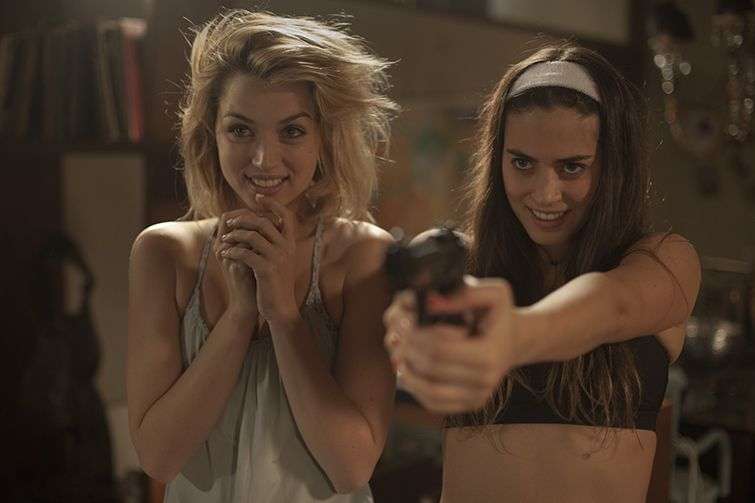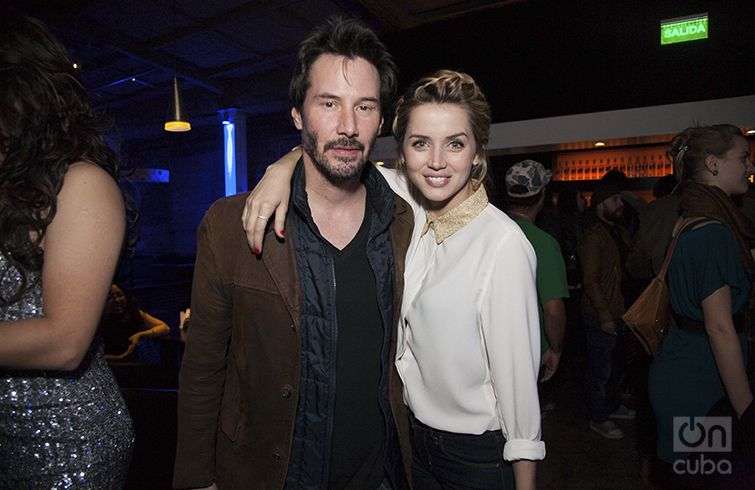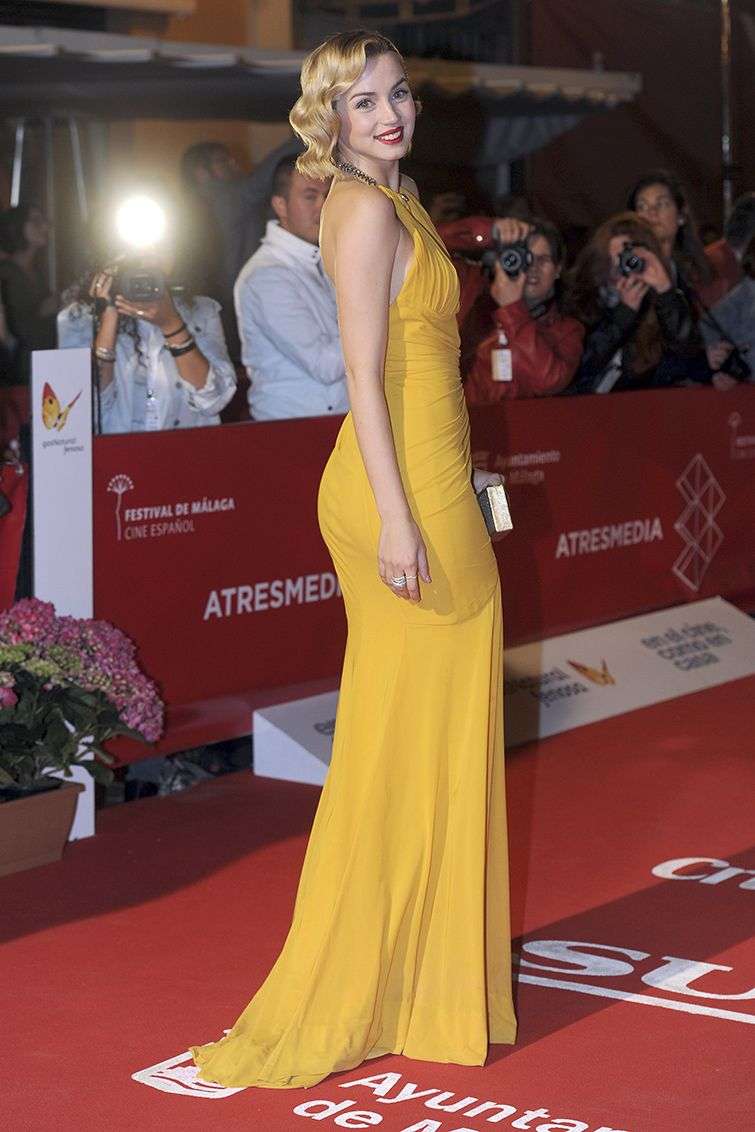I first met Ana de Armas during the filming of Una rosa de Francia (A Rose from France), in which she starred, directed by Manuel Gutiérrez Aragón. At the time, the notable filmmaker had predicted success for the young actress. In Cuba, she acted in three movies, and now in Hollywood, she’s working on her fourth. Ana is very well-known in Spain, where she has spent a large part of her career. Since her debut there more than a decade ago, she has had parts in a dozen films and several television series, enjoying great success. Ana is in demand by directors from all over, from Spain to Hollywood, Latin America to Europe. She now resides in Hollywood, the so-called movie mecca, to continue her career. She is the first Cuban actress to enter the elite of the coveted U.S. industry. Born in Santa Cruz del Norte in the late 1980s, she defends her Cuban-ness wherever she may be. She’s been making headlines on this side of the world, too, and now it’s OnCuba’s turn for an exclusive interview with her.

When you were still a student at Cuba’s National Art School (ENA), you were selected by Manuel Gutiérrez Aragón to star in Una rosa de Francia. How has that influenced your life?
I am in debt to Una rosa de Francia, Manuel Gutiérrez Aragón, Jorge Perugorría, Tamara Morales (casting director), and everyone involved in that project, for being able to discover so freely and so passionately what it means to act in film. That movie taught me all the rules of a film shoot: discipline, study, late nights, respect for all team members, and above all, to realize how lucky we are to do what we love and make a living from it. When you experience that at the age of 16, it can scare you or it can fill you with courage and hunger for more. And I wanted to eat up the world. Moreover, it really opened the door for me to the Spanish market, which later took me in and gave me work for many years.
You also worked with Fernando Pérez, one of Cuba’s most celebrated filmmakers. How do you remember that experience?
Fernando Pérez is one of the best people I’ve ever known. He is a man with an enormous heart, and that is always reflected in his films. I still remember the day I auditioned as if it were today. Fernando whispered something to me, I think to explain the scene; I’m honestly not sure, because what stayed with me was the tone of his voice, sweet and melancholic. His voice was my motivation. Stella Maris was my second experience in film, along with Luis Alberto García, another of the people I love most, and who helped me the most when I was starting out. It was a brief experience, and I had a small part, but I gave it my best and I really enjoyed myself. That time, I didn’t have permission to film from drama school, so I had to sneak out a bunch of times to film at night, and then the next day I would fall asleep in class. It was worth it!
How and when did you go to Spain?
I went to Spain when I finished drama school. Well, technically I didn’t finish school; I had to leave before I presented my final thesis. I was 18 years old and I felt like the time was right to move on. My parents supported me in everything, they always have. I don’t remember having thought it over much, partly because I didn’t know what it meant to live and survive in another country, and partly because I almost never question my instinct. I went with 200 euros in my pocket that I’d saved from the last film that I made in Cuba, El edén perdido, and I told my parents that I’d be back when my money ran out. Of course, that didn’t happen; my money ran out in a week, and I didn’t go back.
When you were chosen for El Internado, were you aware of the success that it would bring you?
I met the casting director for El Internado two weeks after I got to Madrid. And I think that I can say that neither he nor I, nor anybody else, could have imagined what a hit that series would be. And of course, I had no idea whatsoever about what that would mean for me personally.
In different magazines and websites you’re described as a Spanish actress; however, you defend your identity despite your years of experience in Spain. What does being Cuban mean to you?
You simply can’t deny what you are. Having been born in Cuba is part of my identity, not a label. I’ve always been proud of having been born and raised there, because of the personal importance it has for me, the emotional connection, because I respect my roots and my parents. Because my good and bad experiences shaped me and made me into who I am today. I would be just as proud to have been born in another country if I had the same parents and friends that I have in Cuba, the ones I grew up with. That is what Cuba means to me; Cuba is my home because it’s where my people are.
Have you thought about returning to Cuba to film?
I’ve thought about it many times; it’s something I always keep in mind. In fact, I’ve asked friends to pass the word along so that directors know that I’m willing to come back to work. It’s true that there have been times when I’ve been filming for a long time, and when I’ve tried to combine projects, the distance hasn’t been helpful. After so many years, I understand that the connection has been lost, partly because of the way things work in Cuba, where the figure of agent or representative doesn’t exist, and therefore, you don’t have a point of contact. Also, I think that Cuban directors and producers assume that they will get “no” for an answer, and they don’t even try to make the approach. It’s a shame, because actually I’m open to listening to ideas and proposals and contributing to our cinema. Without a doubt, I’d like to be part of Cuban film history.
Why are you moving to Hollywood and taking on the challenge of starting over?
I moved to Los Angeles because my instinct told me it was time to move, to test myself, to dream bigger. I wasn’t completely convinced that I was ready for the challenge, but I thought that if I kept mullling it over, it would never seem like the right time, so I went. For me, starting over is a good thing; it’s another opportunity; it’s learning; it’s demonstrating to myself that I’m strong and I can do anything. It’s the ambition of wanting to be a better person and artist, and I’m not afraid of that. Hollywood is hard; the industry is gigantic and there’s an equal probability that they won’t see you and that they’ll step all over you. Los Angeles can be a very lonely city, but if you have clear ideas and work hard, big opportunities can open up for you. The language and being accepted culturally were not the things I was most worried about. For now, it seems like everything’s going well, although you never know; nothing’s for sure.
How complex has it been for you to modify your Cuban accent for Spanish films, and now to work in English?
When I went to Spain and began working on El Internado, I had the great fortune that all of the series’ producers were in agreement with my accent. Now with English, it’s a different story; it’s not just the accent—it’s the language. So in this case, I am working on it. I don’t want to limit myself to Latina characters, I want to have a much broader range. It will take time, but I’m not experiencing that as something negative; on the contrary, I view it as if I were learning how to use a new superpower. If I’ve come to the place where there’s access to the best projects in the world, it’s not going to be my accent that stops me.
What’s it been like to work with famous actors like Robert de Niro and Keanu Reeves?
It’s hard to explain…. It’s literally insane. Of course, I’ve dreamed of it a thousand times, but I never thought it would come true. They are actors that I’ve admired since I was a child; I grew up watching their movies. Now, a little while later, I’m on the same set, sharing scenes with them. It’s difficult to process. I feel inspired, like I have something to contribute. I feel proud; I feel like my career is growing, little by little, but at the same time, it’s dizzying. I don’t know; I suppose it’s a sign not to give up.
How have you dealt with fame and success? How has it been for you?
Fame and success are never a constant, just like the people who want to be around you or disappear according to their convenience. I’ve always been very clear on that, and I’ve always given it the right amount of importance. I think that the early years of my career were the ones with the most change, and the most critical in terms of the impact of fame on my personal life. But the fact that I always stayed connected with my parents and friends and the many visits I’ve made to Cuba have kept me close to reality. My family is what makes me think every day about what’s really important in my life. My life hasn’t changed much, although at times it is hard to ignore it when people look at you or follow you in the street; I try to stick to my routine and to my world. Now in the United States, everything’s calm again; here, I’m invisible again. So I’m really enjoying that, because I imagine it won’t stay that way forever. When things change, we’ll see what happens, but now I know what to expect, so there’s no way it will be too much for me.












tremenda muñeca, exitos!!